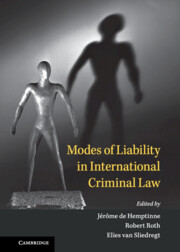Book contents
- Modes of Liability in International Criminal Law
- Modes of Liability in International Criminal Law
- Copyright page
- Contents
- Biographies
- Acknowledgements
- Abbreviations
- 1 Cross-Cutting Issues
- Part I Individual Commission
- Part II Joint Commission
- Part III Participation
- Part IV Participating in Group Activities
- Part V Inchoate and Preparatory Acts
- Part VI Other Forms of Responsibility
- Part VII Concluding Observations
- Index
- References
Part I - Individual Commission
Published online by Cambridge University Press: 01 July 2019
- Modes of Liability in International Criminal Law
- Modes of Liability in International Criminal Law
- Copyright page
- Contents
- Biographies
- Acknowledgements
- Abbreviations
- 1 Cross-Cutting Issues
- Part I Individual Commission
- Part II Joint Commission
- Part III Participation
- Part IV Participating in Group Activities
- Part V Inchoate and Preparatory Acts
- Part VI Other Forms of Responsibility
- Part VII Concluding Observations
- Index
- References
Summary
Commission is a well-established form of liability in ICL.In the Tadić Appeal Judgment,the ICTY confirmed that commissionis first and foremost ‘the physical perpetration … by the offender himself’.Additionally, multiple other forms of commission exist, some of which do not necessarily require that a perpetrator commit a physical offence directly.
- Type
- Chapter
- Information
- Modes of Liability in International Criminal Law , pp. 15 - 82Publisher: Cambridge University PressPrint publication year: 2019

